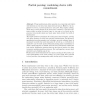Free Online Productivity Tools
i2Speak
i2Symbol
i2OCR
iTex2Img
iWeb2Print
iWeb2Shot
i2Type
iPdf2Split
iPdf2Merge
i2Bopomofo
i2Arabic
i2Style
i2Image
i2PDF
iLatex2Rtf
Sci2ools
115
click to vote
IFL
2007
Springer
2007
Springer
Partial Parsing: Combining Choice with Commitment
Abstract. Parser combinators, often monadic, are a venerable and widelyused solution to read data from some external format. However, the capability to return a partial parse has, until now, been largely missing. When only a small portion of the entire data is desired, it has been necessary either to parse the entire input in any case, or to break up the grammar into smaller pieces and move some work outside the world of combinators. This paper presents a technique for mixing lazy, demand-driven, parsing with strict parsing, all within the same set of combinators. The grammar specification remains complete and unbroken, yet only sufficient input is consumed to satisfy the result demanded. It is built on a combination of applicative and monadic parsers. Monadic parsing alone is insufficient to allow a choice operator to coexist with the early commitment needed for lazy results. Applicative parsing alone can give partial results, but does not permit context-sensitive grammars. But used ...
| Added | 08 Jun 2010 |
| Updated | 08 Jun 2010 |
| Type | Conference |
| Year | 2007 |
| Where | IFL |
| Authors | Malcolm Wallace |
Comments (0)

